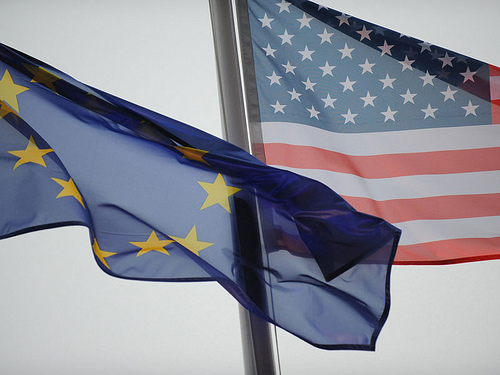
From Tomas Valasek, the Center for European Reform: The US defence budget seems set to fall as Washington begins to restore order in its finances. Spending on the military has reached such heights – $700 billion, or 20 per cent of the US federal budget – that it has become too large for deficit-cutters to ignore. Even traditionally pro-defence Republicans now argue that military expenditures need to be reduced along with other government expenses. Europe, too, will feel the pinch: many of the American soldiers currently based on the continent seem certain to go, and some joint weapons programmes will be cancelled. In case of future crises in Europe, NATO’s and the EU’s ability to respond will be tested. The US will expect Europe to lead but European allies themselves have been reducing forces and budgets. …
The effect of US defence budget cuts on Europe will be five-fold. First, some of the 80,000 US soldiers left in Europe as assurance to NATO allies will most probably leave; [Secretary of Defense Robert] Gates said in January 2011 that “it is clear that we have excess force structure in Europe. …”
Second, the military assistance that the US provides to help allies to modernise and re-arm will continue to fall. In the past decade, the US generously funded equipment purchases in Europe, with most money going to the new allies. …
Third, US personnel on operations in Europe – in Bosnia-Herzegovina and in Kosovo – will likely be reduced or withdrawn altogether. …
Fourth, those European companies that do business in the US will lose some of their orders – but so will their US competitors. …
Fifth, the future of new weapons funded jointly by the US and its allies is in doubt. Already, the Pentagon has announced that it was pulling out of a US-German-Italian project to build a new generation of medium-range missile defences. …
The effect of US reductions will be compounded by cuts to military spending in Europe: there is a risk that reductions on one side of the Atlantic will be used to justify corresponding cuts across the sea. NATO remains the most powerful military block in the world but it will lose some of its ability to handle multiple crises simultaneously.
The main challenge for US and European defence communities for the next few years will be to keep NATO’s mutual defence pledge credible: this will require allies to prioritise missions and to hone their ability to diffuse crises before they require deployment of large forces. Even if no such crises occur, the Americans and Europeans will be busy managing the political fallout from cancelled procurement programmes and reduced operations. To minimise damage, the Pentagon should keep allies apprised of its cost-cutting measures. For their part, the Europeans need to co-ordinate better their own reductions in defence budgets, so as to make sure that enough money and resources are left to cover any shortfalls that US cuts will create.
Tomas Valasek is director of foreign policy and defence at the Centre for European Reform.
Image: transatlantic.jpg
